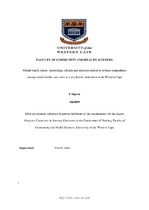| dc.contributor.advisor | Hoffman, Julie | |
| dc.contributor.author | Sigenu, X | |
| dc.date.accessioned | 2021-07-16T11:08:48Z | |
| dc.date.available | 2021-07-16T11:08:48Z | |
| dc.date.issued | 2021 | |
| dc.identifier.uri | http://hdl.handle.net/11394/8283 | |
| dc.description | Magister Curationis - MCur | en_US |
| dc.description.abstract | Research reported that it is very challenging for mental health care users to quit smoking and the risk of relapsing after quitting is high. However, tobacco dependence treatment is possible and potentially lifesaving for people. The delivery of tobacco dependence treatment by nurses is influenced by a variety of factors, including lack of knowledge and skills, limited professional leadership, and smoking within the profession. There is a strong link between mental illness and smoking-related diseases, including cancer, respiratory diseases and heart diseases that are linked with depression. There is a high incidence of cancer in people with bipolar mood disorder and schizophrenia due to smoking. In spite of this, smoking is regarded as part of the culture of psychiatric institutions and tobacco is seen as “necessary self- medication for the mentally ill”. | en_US |
| dc.language.iso | en | en_US |
| dc.publisher | University of Western Cape | en_US |
| dc.subject | Mental health nurses | en_US |
| dc.subject | Knowledge | en_US |
| dc.subject | Attitude and practices | en_US |
| dc.subject | Tobacco dependence | en_US |
| dc.title | Mental health nurses’ knowledge, attitude and practices related to tobacco dependence among mental health care users at a psychiatric institution in the Western Cape | en_US |
| dc.rights.holder | University of Western Cape | en_US |

